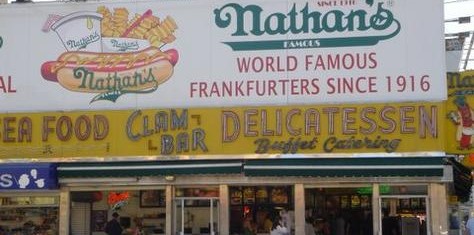
When I was a boy, my dad took me to one of his favorite childhood spots, Nathans Famous Hot Dog stand in Coney Island.
“What makes them famous, Dad?” I asked with the exacting simplicity and demanding tone of a five year old.
“Because everyone knows about them! And because they’re the best hot dogs in the world.” My father loved him a good Nathan’s frankfurter. It made him feel five years old, perhaps.
I had come to question adult answers to very specific child questions by this point. In the rapidly expanding gray matter tucked away in my bushy skull, it seemed illogical for it to be possible to have more than one answer to a perfectly good question (think of my early Star Trek influence), so I was cautious to accept answers as real truth under these circumstances.
Yet, as so many times it happens, even the passionate yet illogical answers we receive as children have a way of weaving themselves into the way we look at the world as adults. So, the Nathan’s Famous incident had a greater impact on me than perhaps the “Sky is Blue because…” incident or the “rocket fuel doesn’t work in automobiles because…” moment.
The belief that everyone knows something when it is famous and that something famous must be the best has significantly influenced me on my journey, sometimes in a good way, and sometimes in a very confusing way. Since we live in a society mildly obsessed with famous people, places and things, it has been hard not to be impacted by the spin we place upon certain people.
We met Richard Nixon at a Soho restaurant several years after he had resigned from the presidency. My mother got him to autograph a paper napkin and I remember him smiling and jostling his hand at me from across the round table. He seemed nice enough to my pre-political self. I hadn’t seen Frost-Nixon at that point.
That same year, 1976, my mom took me to the Museum of Natural History where we toured the Tutenkhaman exhibit. We stood outside in a long line on a sunny spring afternoon with thousands of other fans gathered to see perhaps the most famous dead person on the planet, with surely the best coffin. I was mesmerized as much by the hysteria surrounding this dead pharaoh as the exhibit itself. Surely better than a hot dog with god knows what inside of it.
I was pretty much cool-crazed on Bruce Willis in junior high school, especially during the hit show Moonlighting. My friend Chris and I would get on the phone at 9:58pm every Tuesday night as the credits rolled and begin reciting our favorite one liners. “Do bears bear?” “Do butters fly?” “Do pickets fence?” The witty banter between Bruce Willis and Cybil Shepherd were sublime and we never got enough of Bruce’s flirty, smart-ass grins. They fit perfectly with our hormone riddled, heat-seeking bodies and the trajectory into high school.
You can imagine how hard I squeezed my burgeoning psychic abilities into manifesting a meeting with Mr. Willis the first time I made it to Los Angeles as a 15 year old young man. It was at Catch a Rising Star, the stand up comedy club, that I conjured him. He sat by himself at the bar with a Molson Golden lager (remember those) and stared ahead at the bar, occasionally smiling at a joke from onstage. My friends, already very impressed that I had come through on my predicted star sighting, nudged me out of my seat to go and meet L.A.’s Famous. I walked up alongside him with a napkin and pen in hand (think Dick Nixon), and with my best charm, fed him his own line back to him. “Mr. Willis, do bears bear?”
“Aw, not now kid, after the show.” And he turned back to his beer.
Nixon was friendlier. I was crushed. Moonlighting went off the air the next year and Demi Moore left him for Ashton Kutcher, eventually. Just saying.
 A few years later we were in L.A. again for my cousin’s wedding and as we rode the elevator at the Beverly Hilton, Roseann Barr hopped on, alone and vulnerable to east coast star force newbies. She was even worse than Bruce Willis had been, squeezing out a snarl to our advances. It’s not like we tried to run off with her purse. Famous, yes. Best? Oh, come on.
A few years later we were in L.A. again for my cousin’s wedding and as we rode the elevator at the Beverly Hilton, Roseann Barr hopped on, alone and vulnerable to east coast star force newbies. She was even worse than Bruce Willis had been, squeezing out a snarl to our advances. It’s not like we tried to run off with her purse. Famous, yes. Best? Oh, come on.
I went on to meet lots of “famous” folks in my 40 years. Had the pleasure of meeting Nusrat Fateh Ali Khan before a Berkeley Bowl concert, someone who was the best Qawaali Sufi singer in the world, famous most places outside of North America. I saw him exiting an Indian restaurant just hours before I would attend his concert and I screeched my pick-up truck to a halt, jumped out and charged him. His bodyguards promptly stopped me and then the Master waved them to let me through and he gave me a most satisfying bear hug. A pleasing memory.
There have been writers and teachers, spiritual guides, gurus, movie stars and newscasters. Some famous, some the best. Just last summer I had the pleasure of meeting Michael Pollan, Sonia Choquette, Louise Hay, Wayne Dyer, Cheryl Richardson, Caroline Myss and a score of others. Granted, many of them were on a Hay House cruise so it was like spearing fish in a barrel but it was all rather pleasant anyhow.
So, what about all these famous people, places, and things? Some call them Proper Nouns. I suppose because most of them require a certain proper behavior when one interacts with them in public. Stand behind this line, don’t move from that spot, pretend not to notice me unless I acknowledge you first, make sure you don’t overstay my kindness as I’ve just listened to your story about why you are so excited to be meeting me… it goes on.
To be truthful, there are lots of very real famous people who act as normal as the next person. There are also a fair amount of wing-nuts who might have traumatized some of the more well known folks roaming the planet with unusually poor boundaries and creepy vibes. Still, I continue to wonder what really makes a person famous. In this day and age, a person can become famous for shouting at the president during a speech or throwing a shoe at another one. Fame can come from waving a light saber around and posting it to YouTube or just telling a reporter that this group of people or that is bad. Instant Fame.
Hardly the best, though. It takes something more to be the best. Being the best is like being Superman. The best is like writing poetry like Hafiz or Rumi. Singing like Ella or Louis. The best is a Gandhi or a Jesus. Top-of-your-game kind of best. I suppose what made Nathan’s hot dogs the best for my dad had little to do with ingredients, proper cooking or even toppings. It was about that epiphany experience when he first realized the greatness for himself. What makes something or someone the best is our relationship to that thing or that person. What if I was in a bad mood when I bit my first Nathan’s hot dog? Would it’s greatness shatter my melancholy and its truth change me for life?

 We don’t have receive any information about Zuckerberg’s family history in the film. In fact, we hear about his best friends’ father a lot, meet the twins’ father and perceive his influence throughout, yet there is no connection for Mark with his father. Zuckerberg’s dad is clearly absent in mention but dramatically present as a ghost role. This was, for me, one of the most unsettling factors in the film. We are to believe that the man behind the curtain doesn’t have parents and that he is as alone in the world as he seems; or as he forcefully creates himself to be, squeezing even the people who like him out of his tiny bubble.
We don’t have receive any information about Zuckerberg’s family history in the film. In fact, we hear about his best friends’ father a lot, meet the twins’ father and perceive his influence throughout, yet there is no connection for Mark with his father. Zuckerberg’s dad is clearly absent in mention but dramatically present as a ghost role. This was, for me, one of the most unsettling factors in the film. We are to believe that the man behind the curtain doesn’t have parents and that he is as alone in the world as he seems; or as he forcefully creates himself to be, squeezing even the people who like him out of his tiny bubble.



 A few years later we were in L.A. again for my cousin’s wedding and as we rode the elevator at the Beverly Hilton, Roseann Barr hopped on, alone and vulnerable to east coast star force newbies. She was even worse than Bruce Willis had been, squeezing out a snarl to our advances. It’s not like we tried to run off with her purse. Famous, yes. Best? Oh, come on.
A few years later we were in L.A. again for my cousin’s wedding and as we rode the elevator at the Beverly Hilton, Roseann Barr hopped on, alone and vulnerable to east coast star force newbies. She was even worse than Bruce Willis had been, squeezing out a snarl to our advances. It’s not like we tried to run off with her purse. Famous, yes. Best? Oh, come on.












 Jeffrey Sumber is changing the world, one relationship at a time. For over two decades, Jeffrey has worked to understand the human experience from as many angles as possible. As a successful psychotherapist, marriage counselor, and life coach, Jeffrey has worked with thousands of clients who strive to live their best lives.
Jeffrey Sumber is changing the world, one relationship at a time. For over two decades, Jeffrey has worked to understand the human experience from as many angles as possible. As a successful psychotherapist, marriage counselor, and life coach, Jeffrey has worked with thousands of clients who strive to live their best lives.